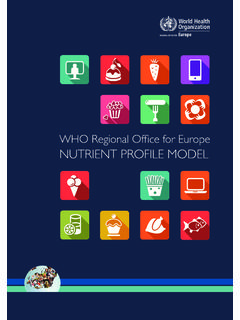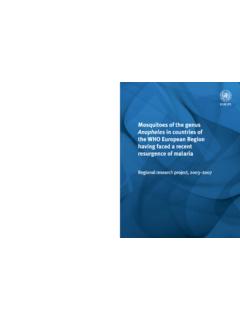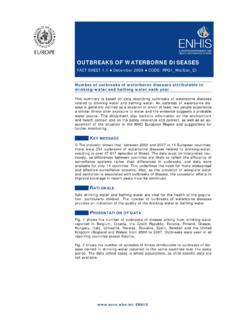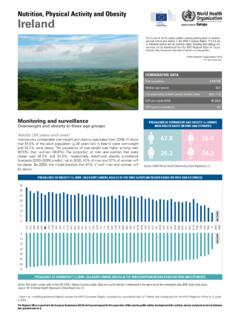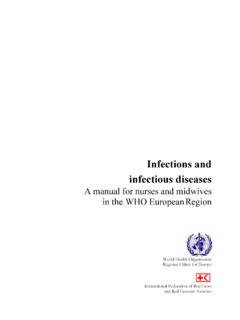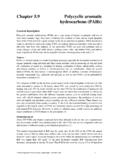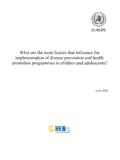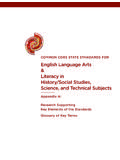Transcription of What is the evidence on school health promotion in ...
1 What is the evidence on school health promotion in improving health or preventing disease and, specifically, what is the effectiveness of the health promoting schools approach? March 2006 ABSTRACT This is a health evidence Network (HEN) synthesis report seeking to determine the effectiveness of health promotion in schools and, more specifically, the effectiveness of the health promoting schools approach. The review of evidence covers mental health , aggressive behaviour, healthy eating, physical activity, substance use and misuse, driver education, and peer approaches. The report shows that effectiveness of different types of programmes varies. school -based programmes that promote mental health , healthy eating and physical activity are amongst the most effective, while programmes on preventing substance use, and suicide are among the least effective of school health promotion programmes. HEN, initiated and coordinated by the WHO Regional Office for Europe, is an information service for public health and health care decision-makers in the WHO European Region.
2 Other interested parties might also benefit from HEN. This HEN evidence report is a commissioned work and the contents are the responsibility of the authors. They do not necessarily reflect the official policies of WHO/Europe. The reports were subjected to international review, managed by the HEN team. When referencing this report , please use the following attribution: Stewart-Brown S (2006). What is the evidence on school health promotion in improving health or preventing disease and, specifically, what is the effectiveness of the health promoting schools approach? Copenhagen, WHO Regional Office for Europe ( health evidence Network report ; , accessed 01 March 2006). Keywords health promotion health EDUCATION SCHOOLS PROGRAM EVALUATION META-ANALYSIS EUROPE The World health Organization does not warrant that the information contained in this publication is complete and correct and shall not be liable for any damages incurred as a result of its use.
3 The views expressed by authors or editors do not necessarily represent the decisions or the stated policy of the World health Organization. Address requests about publications of the WHO Regional Office for Europe to: Publications WHO Regional Office for Europe Scherfigsvej 8 DK-2100 Copenhagen , Denmark Alternatively, complete an online request form for documentation, health information, or for permission to quote or translate, on the WHO/Europe web site at World health Organization 2006 All rights reserved. The Regional Office for Europe of the World health Organization welcomes requests for permission to reproduce or translate its publications, in part or in full. The designations employed and the presentation of the material in this publication do not imply the expression of any opinion whatsoever on the part of the World health Organization concerning the legal status of any country, territory, city or area or of its authorities, or concerning the delimitation of its frontiers or boundaries.
4 Where the designation country or area appears in the headings of tables, it covers countries, territories, cities, or areas. Dotted lines on maps represent approximate border lines for which there may not yet be full agreement. The mention of specific companies or of certain manufacturers products does not imply that they are endorsed or recommended by the World health Organization in preference to others of a similar nature that are not mentioned. Errors and omissions excepted, the names of proprietary products are distinguished by initial capital letters. The World health Organization does not warrant that the information contained in this publication is complete and correct and shall not be liable for any damages incurred as a result of its use. The views expressed by authors or editors do not necessarily represent the decisions or the stated policy of the World health Organization. 2 What is the evidence on school health promotion in improving health or preventing disease and, specifically, what is the effectiveness of the health promoting schools approach?
5 WHO Regional Office for Europe s health evidence Network (HEN) March 2006 The 4 4 Policy Type of school health health promoting Magnitude of the Sources of Review of reviews of health promotion in Mental health promotion and the prevention of mental health Substance use promotion of healthy eating and physical Other health promoting 13 Gaps in the Conflicting Gender Cost Strength of Appropriate research to study health school health health promoting Generalizability of Policy Annex 1: Search methods and definitions of key Inclusion Exclusion Definition of Definition of health promotion in Definition of health promoting school Annex 2: Details of studies 24 3 What is the evidence on school health promotion in improving health or preventing disease and, specifically, what is the effectiveness of the health promoting schools approach? WHO Regional Office for Europe s health evidence Network (HEN) March 2006 Summary The issue school health promotion , based on a wide range of research and practice, has evolved over the course of the last 50 years, alongside health promotion in other settings.
6 During the 1990s, WHO, working jointly with the European Commission and the Council of Europe, developed the health promoting schools initiative. It is a multifactorial approach that covers teaching health knowledge and skills in the classroom, changing the social and physical environment of the school , and creating links with the wider community. This synthesis seeks to determine the effectiveness of health promotion in schools and, more specifically, the effectiveness of the health promoting schools approach. The synthesis builds on the last comprehensive review in this field, published in 1997. Findings This synthesis identified good quality systematic reviews that covered mental health , aggressive behaviour, healthy eating, physical activity, substance use and misuse, driver education, and peer approaches. Reviews of programmes that promoted mental health in schools (including preventing violence and aggression) show these programmes to be among the most effective ones in promoting health .
7 Of these programmes, the ones that were most effective were of long duration and high intensity, and involved the whole school . New reviews that focused on promoting healthy eating and physical activity confirmed an earlier review, which found that multifactorial interventions, particularly those involving changes to the school environment, were effective. Four new reviews of programmes that focused on promoting the prevention of substance use confirmed previous findings that these programmes are relatively ineffective. Also, programmes on preventing suicide reduced suicide potential, depression, stress and anger, but less rigorous studies suggested a potential harmful effect in young males. In some (but not all) studies, peer-delivered health promotion was found to be effective, compared with teacher-led interventions, and this approach was highly valued by the young people involved. The systematic review, which evaluated health outcomes of programmes that used elements of the health promoting schools approach, included small studies of variable quality.
8 It found apparent benefits to the social and physical environment of the school , and some studies found the programmes benefited health -related behaviour (dietary intake and physical fitness). No reviews evaluated the cost effectiveness of the programmes or interventions. Policy considerations health promotion in schools can improve children s health and well-being. Among the most effective programmes are those that promote mental health , healthy eating and physical activity. Programmes on preventing substance abuse have not been shown to be effective and may be better addressed in a more holistic programme that promotes mental health . Programmes on preventing suicide can reduce suicide potential, but potential harmful effects in young males should be considered. Although programmes based on peer-delivered health promotion are highly valued by young people, their effectiveness varies. Some evidence supports key components of the health promoting schools programme namely, that programmes should be sustained, multifactorial, whole school approaches that provide appropriate training.
9 However, there is a lack of evidence on all the elements that contribute to an effective health promotion programme, or to the health promoting schools approach as a whole. A holistic evaluation of programmes in local settings is needed. 4 What is the evidence on school health promotion in improving health or preventing disease and, specifically, what is the effectiveness of the health promoting schools approach? WHO Regional Office for Europe s health evidence Network (HEN) March 2006 Type of evidence This review is based on robust systematic reviews of controlled trials of school -based health promotion initiatives. Reviews on school health services and screening programmes were not included. 5 What is the evidence on school health promotion in improving health or preventing disease and, specifically, what is the effectiveness of the health promoting schools approach? WHO Regional Office for Europe s health evidence Network (HEN) March 2006 Contributors Author Sarah Stewart-Brown Professor of Public health Division of health in the Community Warwick Medical school , LWMS The University of Warwick Coventry CV4 7AL United Kingdom Tel: 00 44 (0) 24 765 74510 Fax: 00 44 (0) 24 765 28373 Email: Technical editors Professor Karen Facey, Dr Leena Eklund and Professor Alicia Granados, health evidence Network, WHO Regional Office for Europe.
10 Peer reviewers Professor Matti Rimpel , National Research and Development Centre for Welfare and health (STAKES), Finland; and Dr Vivian Rasmussen, Child and Adolescents health Programme, WHO Regional Office for Europe. 6 What is the evidence on school health promotion in improving health or preventing disease and, specifically, what is the effectiveness of the health promoting schools approach? WHO Regional Office for Europe s health evidence Network (HEN) March 2006 Introduction school health promotion Since the 1950s, schools have been a popular setting for health promotion and health education (1). Early programmes focused on teaching children about health and its determinants, but the importance of enabling them to develop the skills to resist unhealthy lifestyles was soon recognized. Most programmes now teach these skills. The development of school health promotion programmes has been influenced in general by developments in health promotion policy. The Declaration of Alma-Ata in 1978 (2), which aimed to provide a framework for the development of health strategies in WHO Member States, called for multisectoral approaches to health promotion and for public participation in developing and providing health programmes.

